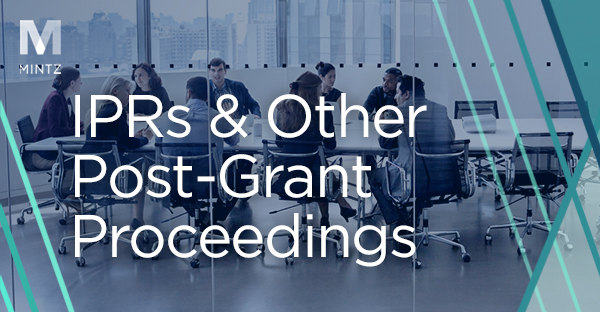Patent Owner Tip #7 for Surviving an Instituted IPR: Work with Your Expert to Make the Declaration Navigable and Well Supported
Expert declarations are an essential component of any patent owner’s effort to survive an instituted inter partes review (“IPR”). The Board relies heavily on expert testimony in order to evaluate and understand the technology at issue from the point of view of a person of ordinary skill in the art (“POSA”). The expert declaration can also help to explain the meaning of claims terms in the context of the patent and help protect against hindsight bias. Because of the weight afforded, the patent owner must ensure that the expert’s affirmative testimony withstands scrutiny from the Board, as we previously discussed. A good place to start is with a declaration that is structured in a way that your chosen expert is most comfortable with in order to help eliminate unforced errors during a deposition.
Work with Your Expert to Organize the Declaration to make it Navigable
As one of the most important aspects of an IPR proceeding, the expert declaration and testimony within should be well reasoned and well supported. It should also be well organized, and arranged in a way that makes sense to the expert. During the deposition, your expert will need to not only withstand the scrutiny of a cross-examination but will need to do so while also navigating the affirmative testimony in the declaration. Making that a seamless process versus your expert needing to search through the declaration under duress or rely on memory will prevent misstatements and other unforeseen errors. It is therefore important to work with your expert and understand their preferences. For instance, your expert may prefer to express opinions with charts and diagrams, or treat the declaration like a scientific article. There is no one-size-fits-all scheme, but arranging the declaration in a manner that is easily navigable for your expert will help reduce the pressure and set the stage for a successful deposition. Accordingly, you should avoid the temptation of oversaturating the declaration with extraneous information as this will only create a maze of information that may impede your expert’s ability to quickly locate important affirmative testimony.
Additionally, be sure to walk through the organization of the declaration with your expert so that your expert understands the purpose behind the different sections. This will give you an opportunity to also remind your expert about which sections of the declaration they are not responsible for, such as questions regarding the legal standards.
Organize and Identify Background References in a way that Enables Your Expert to Educate the Board about the Technology
Your expert needs to teach the Board about the technology at issue and the state of the art at the time of the invention from the point of view of a POSA. Therefore, work with your expert to identify and analyze background references that can be used prominently to support positions. These same background references can also be used to address factual disputes. In doing so, make sure to provide enough detail to trigger your expert’s memory and the basis for their analysis. That way, when your expert is under pressure from answering questions under oath, they can easily locate their affirmative testimony and remember the basis of their analysis.
Remember, at the patent owner response stage of the IPR, your expert can affirmatively address and clarify factual issues. Having the final word at a deposition may present an advantage, but not if the expert stumbles through it. Any need to rely on memory under pressure is a recipe for a mistake and testimony that is inconsistent with the affirmative opinions. Not only does this impact your expert’s credibility with the Board, but it may also come back to haunt you in related district court proceedings. The expert declaration is a great vehicle to educate and persuade the Board, but only if your expert can easily interpret and defend it.
To learn more from the Mintz IP team, follow us on LinkedIn and check out our Exclusive Rights podcast.


